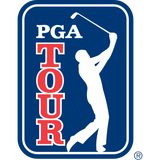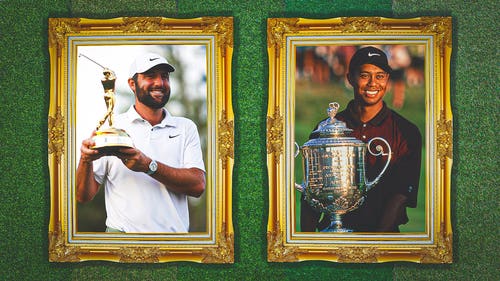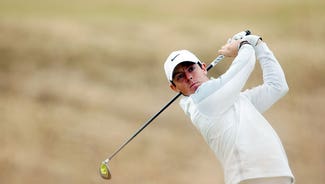
Tour Confidential: With Sergio off the list, who's the best player without a major?
Every Sunday night, GOLF.com conducts an e-mail roundtable with writers from Sports Illustrated and GOLF Magazine. Check in every week for the unfiltered opinions of our writers and editors and join the conversation by tweeting us @golf_com.
1. In his story about Sergio Garcia's victory at the Masters, our Alan Shipnuck said that Rickie Fowler had inherited the dubious mantle of Best Player Never to Have Won a Major. That sparked a debate on Twitter, some saying that, at 28, Fowler was too young to be burdened with such a label. (Our travel guru, Joe Passov, also took a stab at the list post-Masters, placing Lee Westwood at the top.) What say you? Using your own criteria, who's the BPNTHWAM?
Jessica Marksbury, multimedia editor, GOLF.com (@Jess_Marksbury): I'm going to give Rickie a pass here, because as good as he is, he hasn't been in the hunt at a major championship that often. Lee Westwood is probably the best choice here, with three runner-ups, six thirds and 11 top fives—yikes! Poor guy! With three top fives and eight top 10s, I'll cast a vote for Matt Kuchar as well.
Michael Bamberger, senior writer, Sports Illustrated: Taking the term literally, I'll say Doug Sanders. Allowing only for modern male players, I'll take Lee Westwood.
Alan Shipnuck, senior writer, Sports Illustrated (@AlanShipnuck): Obviously I should recuse myself here but I would just like to say that I disqualified Westwood because to be the BPNTHWAM you actually have to be a threat to win one, and in the last three or four years whenever Westy has sniffed the lead in a big tournament his wedge and putter go haywire. At 43 he's clearly way past his prime. Meanwhile, Fowler is ascendent.
Josh Sens, contributing writer, GOLF (@JoshSens): All good choices. Farther down the list, I might add Snedeker. And though it was only for an eye-blink, just five years ago, Luke Donald was the No. 1-ranked player in the world.
Joe Passov, senior writer, GOLF Magazine (@joepassov): I'll defend myself here, and stick with Westwood. In terms of the player with the best record, still current and at least an occasional contender, with most worldwide wins, most top fives, top 10s and close calls in majors, it's Lee. Sure, Rickie's the better player right now, as is Hideki Matsuyama and Justin Thomas, but “best player NEVER to have won a major” implies that they've been at it awhile--which they haven't. Give ‘em time.
2. Play on Sunday among most of the leaders at the RBC Heritage was spotty, to be kind. Wesley Bryan, arguably the steadiest of the pack, fired a final-round 67 to clip Luke Donald by a shot. Bryan, who got a promotion to the PGA Tour by winning three times on the Web.com tour in 2016, had been knocking on the door. Make a case for why Bryan, 27, is here to stay.
Marksbury: I wasn't a fan of the decision to eliminate Q-School as a means of gaining entry to the PGA Tour, but I have to say that I'm impressed by the Web.com “graduates” who have been claiming Tour wins, like Cody Gribble and Mackenzie Hughes earlier this season. Wesley Bryan is the latest to make a big splash, and it's clear he knows how to win. He didn't wilt down the stretch, and Harbour Town requires some demanding shotmaking. I'm impressed by his mettle, and I'm looking forward to seeing more.
Shipnuck: Already on Tour the other players talk about Bryan's wedge game as if it's voodoo. The guy just has a knack for scoring and heavy mettle on Sundays. He's definitely here to stay.
Bamberger: I didn't watch the golf on Sunday. It's hard to make a case that any player is here to stay. It's one of the beautiful things about the best tours. We don't know and we can't know. Sunday play is an interesting subject. I thought on Sunday at Augusta, with all that talent chasing the day's final twosome of Rose and Garcia, that somebody would shoot a back-nine 31 or 32 and post a winning score. In other words, rise. The equipment is great and the players are more athletic but going low on Sunday afternoon is a skill that cannot be taught or bought.
Sens: Bryan has definitely been impressive. But on the PGA Tour, it's much easier to make the case that tomorrow is promised no mone than it is to say that someone is here to stay.
Passov: I can't make that case yet--though if you're insisting that I do, I'll say he's here to stay because he has long, vast experience being in the limelight, and as the last two years have shown since he abandoned the sideshow business and rededicated himself to tournament golf, he's a proven winner. That bodes well.

3. In the wake of the Lexi Thompson rules fiasco about whether viewers should be allowed to report potential violations, our Michael Bamberger took a contrarian view, saying, “A player should want the scrutiny that comes with playing on TV because the player is not trying to get away with anything. The player should want to turn in the most accurate scorecard he or she can, with help from anybody who's watching.” Thoughts?
Marksbury: Golf is supposed to be a game of personal integrity. Everyone is meant to abide by the rules to the best of his or her ability. It's up to you to call an infraction on yourself or your opponent. Even if the ruling is correct, call-ins from fans, especially after the fact, just seem wrong to me. I don't think golf's founding fathers intended for super slo-mo HD zoom-ins when they decreed that the ball should be placed as nearly as possible to its original spot after marking. If it seems right to the player and his or her playing partner at the time, that should be enough.
Bamberger: Well, not surprisingly, I respectfully beg to differ, ma'am. The rules allow for what you are talking about. If the player could not have known he or she was violating a rule, and there are circumstances for that, there is no penalty. But if you start with the premise of integrity, the player should WANT to know if he or she violated a rule. The reason the system works is because there are two parts to it: the player's integrity AND the possibility of condemnation from his or her fellow pros for not following the rules. If you're doing everything correctly, you have nothing to worry about. The call-in people don't make decisions. They just alert officials to possible rules infractions and the rules officials take it from there. The starting point to understanding this issue is that golf IS NOT LIKE ANY OTHER SPORT. The players, in theory and in practice, are not trying to “get away” with anything. Just the opposite.
Shipnuck: I come down somewhere in between you two gents. Michael's thesis is correct that tournament golf is built on strict adherence to the rules; once you lose that, anarchy ensues. But call-ins certainly repel the casual fan. So I'm gonna take a nice, comfy seat atop this fence, the better to straddle.
Sens: On the matter of integrity, I disagree with the notion, commonly propagated in golf, that golfers are somehow more inherently honorable than other athletes. It's not always stated explicitly, but it often is, and I think it's a distortion borne of the mythology that the game has spun around itself. On the (related) matter of call-ins, I have no problem with them in theory. But from a practical standpoint, they've proven problematic. Very hard to make timely rulings when they're triggered by people ringing in, often long after the fact. For that reason, I'd like to see them done away with.
Passov: I've been saying forever that TV call-ins should have no place in affecting the outcome of a golf tournament. Michael, with all due respect, we are not protecting the field here. Only the leaders and the big-name players come under constant television scrutiny. If you don't have cameras showing every shot from every player in the field, then you're discriminating unfairly against certain players merely because of their status. It should be all or none, period.

4. Tommy's Honour, a film on the lives and careers of two of golf's most famous figures, Old Tom Morris and his son, Young Tom Morris, hit the big screen on Friday. While we can't have too many golf movies, the reviews have been mixed. On a scale of 1 to 10, how excited are you to see this film?
Marksbury: Very - I'll go with an 8! I had the chance to interview director Jason Connery and it's clear the film was made with a lot of love and respect for the game's history. Plus, it's a fascinating story that is about much more than just golf.
Bamberger: Lady Bamberger and I saw it Friday night and very much enjoyed it! Thrilled for all those who worked so hard to get it to the big screen. (Christine likened it to “Downton Abbey.”) Suggest you see it in a real theater if you can.
Shipnuck: Well, I was more excited until I saw the commercial where an approach shot rips backward with modern-day Tour spin - pretty sure that didn't happen with mid-19th century equipment and agronomy. But I liked the book and want to support its author - former SI colleague Kevin Cook - so I'll put my excitement at 8.2.
Sens: 9.2. Though these days I'm excited about pretty much any film other than the crummy Marvel productions my kids make me watch.
Passov: 8.5. Just for the fact that it will get folks talking about Old Tom Morris again thrills me. I'm a big fan of the best beard in golf history. And Young Tommy, too--a guy whose early scoring and shotmaking feats were so remarkable that in the best-selling, mid-1970s “Book of Lists,” the legend authoring the golf section, Herbert Warren Wind, ranked Young Tom Morris as the greatest player ever. But I'm leery every time Hollywood has to inject romance into it--or Morgan Freeman--just for Hollywood's sake. I'm optimistic with this one, though.

5. Billy Horschel left Harbour Town on Tuesday to be with his wife, Brittany, for the birth of their second child. But he was back on the property on Wednesday and teed it up on Thursday. After opening with a one-under 70, Horschel fired a 78 on Friday, missed the cut and was back home with the family. Golf gods? And fess up: What's the most egregious event you've put aside to get in 18 holes?
Marksbury: I'm guilty of taking a day off from work to play in a mid-am qualifier. Does that count?
Bamberger: I believe I once missed a dental appointment because of a sudden desire to play a round of golf. As I think about it, it may have happened more than once.
Shipnuck: I can't play good golf whilst feeling guilty. That said, I've blown off plenty of late finishers at various Tour events to sneak in some twilight golf on the road.
Sens: I didn't blow off the birth of my daughter, but I did sneak out to play two days after she was born, just to prove to myself that my golf life hadn't ended with fatherhood. Bad idea. I think I shot 130 out of guilt. Golf is hard enough when you're playing with a clean conscience. It's impossible when you're addled. Lesson learned. Nowadays, I don't play without getting a papal blessing and a presidential pardon. The wifer often has a say too.
Passov: I was supposed to be covering the 2001 PGA Championship at Atlanta Athletic Club, but on Saturday, I just had to get away and sample the two Grand National courses on the Robert Trent Jones Trail at Auburn/Opelika. The rains came after 31 holes, and we drove back to Atlanta. I re-entered the grounds and within seconds, heard a gigantic roar. Ah, yes, that would be leader David Toms making an ace on the 243-yard, par-3 15th hole — where I would have been had I not played hooky in Alabama.







































































































































